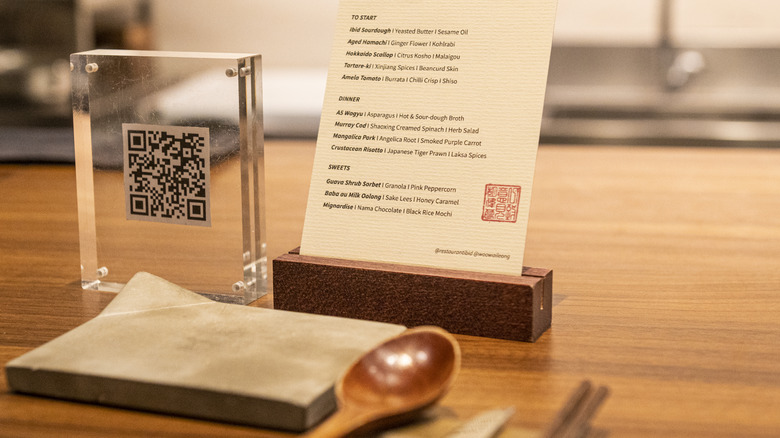What A Short, Simple Restaurant Menu Tells You About The Food
Have you ever opened the menu at a classic diner and felt a little ... overwhelmed? You know the type: six pages of breakfast platters, deli sandwiches, open-faced sandwiches, soups, burgers, desserts, and more, all single-spaced and written in 8-point font. Maybe you have a Midwestern grandparent who always gruffly insists that "They should only have three menu items, and two of 'em that I don't like." In situations like these, it helps to have a go-to diner menu order to fall back on. (For chef David Chang, it's a patty melt). But, while we love a good mom-and-pop diner as much as the next foodie, the best strategy for bypassing this situation might be to just eat somewhere with a more stripped-down selection of dishes, and not just because of the menu fatigue.
The Cheesecake Factory has over 250 menu items and they're all cooked from scratch. Prep time starts at 6:00 a.m. daily. But, alas, we can't all be The Cheesecake Factory, and in most cases, a short, simple restaurant menu is actually a good sign. When a restaurant sticks to one type of food, it's often an indicator of an area of specialty. If the kitchen team has spent hours just cranking out empanadas and tamales, you can be sure they're folding that dough with focus and expertise.
Less is more for a solid menu
Restaurant menus can be more revealing than you might think — and areas of specialization correspond to a deeper knowledge of particular flavor profiles. Maybe you can order to-go Pad Thai from the bodega in the Polish neighborhood, but at a traditional Thai restaurant, the chef will likely know a lot more about cooking with coconut milk and shrimp paste. Plus, if a restaurant is known for one type of food in a highly competitive food industry, it has to be pretty good just for the place to remain open.
Also, fewer dishes mean fewer ingredients to stock, and chances are that restaurants with simpler menus can better focus on the freshest ones available. Sure, you could order lobster from the sit-down pizza joint, but how often are people really ordering lobster? How long has that little guy been in the tank? And how skilled or experienced is the chef at preparing that dish? Chances are they're more in the pocket when expertly tossing a circle of dough. Opting for a restaurant with a short, simple menu can be a particularly solid tip for avoiding food poisoning when traveling. As Anthony Bourdain once shared in a CNN interview, "You are far more likely to get ill at the ... tourist-friendly restaurant that tries to be everything to everybody, [where] you can have the local specialty but also nachos."

